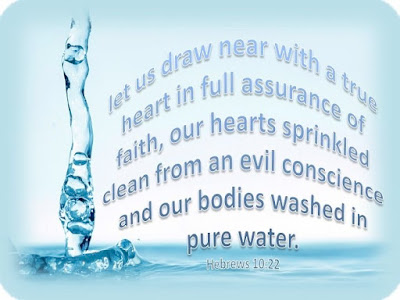Therefore, brethren, having boldness to enter the Holiest by the blood of Jesus, by a new and living way which He consecrated for us, through the veil, that is, His flesh, and having a High Priest over the house of God, let us draw near with a true heart in full assurance of faith, having our hearts sprinkled from an evil conscience and our bodies washed with pure water. (Heb 10:19–22)Access to God had previously been restricted to the priesthood, and only the High Priest could enter the Holiest, and only on the Day of Atonement (Lev 16:11–16). Since Jesus, in His high-priestly office, applied His precious blood on the heavenly mercy seat as the full final atonement, all believers, in their vocation as a priesthood, have gained access.
While the people were consecrated corporately as a chosen people through the sprinkling of blood and the Word of God (Exod 24:3–8), priests were consecrated individually (Exod 29:1–37) with their primary duty being the daily service (Exod 29:38–46). Part of the consecration rite involved the following actions:
- Bodies washed
- And Aaron and his sons you shall bring to the door of the tabernacle of meeting, and you shall wash them with water. (Exod 29:4)
- Blood sprinkled
- And you shall take some of the blood that is on the altar, and some of the anointing oil, and sprinkle it on Aaron and on his garments, on his sons and on the garments of his sons with him; and he and his garments shall be hallowed, and his sons and his sons’ garments with him. (Exod 29:21)
For since man is of twofold nature, soul and body, the purification also is twofold, the one incorporeal for the incorporeal part, and the other bodily for the body: the water cleanses the body, and the Spirit seals the soul; that we may draw near unto God, having our heart sprinkled by the Spirit, and our body washed with pure water. When going down, therefore, into the water, think not of the bare element, but look for salvation by the power of the Holy Ghost: for without both you cannot possibly be made perfect. (“On Baptism,” Catechetical Lectures III.4)The author of Hebrews used this association to the priest in order to build the case that these believers stood in a unique position with a holy vocation that their past life in Judaism could never afford: the recipients had the holy privilege of open access to God’s presence, so they should not lose heart and return to Judaism but persevere in their adversity. To do so, he recounts what has been accomplished in them through working of each Person of the Godhead, demonstrating how each part of the work stands within redemptive history as it was promised to His people and fulfilled in Christ. To turn back now would be paramount to unbelief and God’s wrath, but the writer was confident that they would remember their baptisms and confidently continue in the faith they had received.

No comments:
Post a Comment